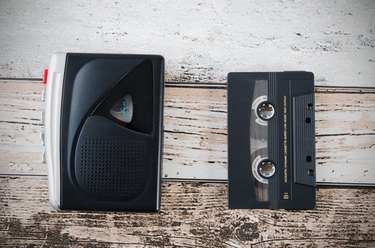
Real repair work on a cassette deck is beyond most of us, but some simple maintenance techniques are within grasp to fix common cassette-deck problems. If you're unsure about a symptom or uncomfortable performing a fix yourself, a trip to the shop may be in order.
Step 1
Check all cable connections to make sure they're secure.
Video of the Day
Step 2
Change the cable connecting the cassette deck to your receiver.
Step 3
Clean tape heads with isopropyl alcohol and cotton swabs. Oxide particles can flake off of tapes and collect here.
Step 4
Clean the contacts on the player and receiver with electronics-grade contact cleaner.
Step 5
Make sure the cassette output cables are going to the receiver's "tape," "cassette" or "aux" input. The "mon" (monitor) input will produce a low volume.
Step 6
Clean capstan and pinch rollers (the parts that spin around to move the tape) with isopropyl alcohol and cotton swabs.
Step 7
Inspect any belts (usually thick black rubber bands) that you can see inside the deck for wear.
Step 8
Replace broken, brittle or stretched belts.
Step 9
Loss of High Frequencies. Make sure the bias settings are correct for the type of tape you're using (I, II or IV) and that the noise-reduction settings used in playback are the same as those used during recording. Check to see if tape heads need to be realigned or replaced.
Step 10
Incomplete Erasing of Tapes. Demagnetize tape heads with a cassette-deck demagnetizer (available at electronics stores). Check if the erase head needs to be replaced.
Step 11
Poor Sound With Tapes Made on Other Cassette Decks. Try adjusting the bias. On some high-end decks, this can be set by the user.
Step 12
Muffled or Garbled Sound, Especially With Tapes Made on Other Decks. Angle of the tape head gap, or azimuth, may need to be realigned by a technician. However, doing this will make tapes you've already recorded with the bad alignment sound wrong.
Step 13
Tapes Getting Jammed. The capstan is turning but the take-up reel is not, causing loose tape to bunch up and get jammed. Look for a worn or broken belt or a broken gear that might need replacing.
Video of the Day